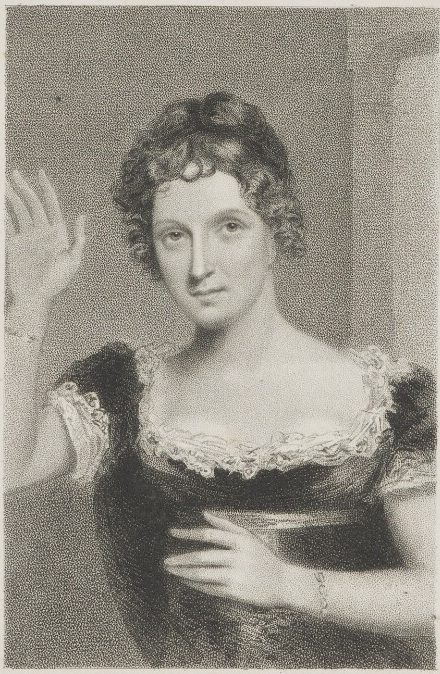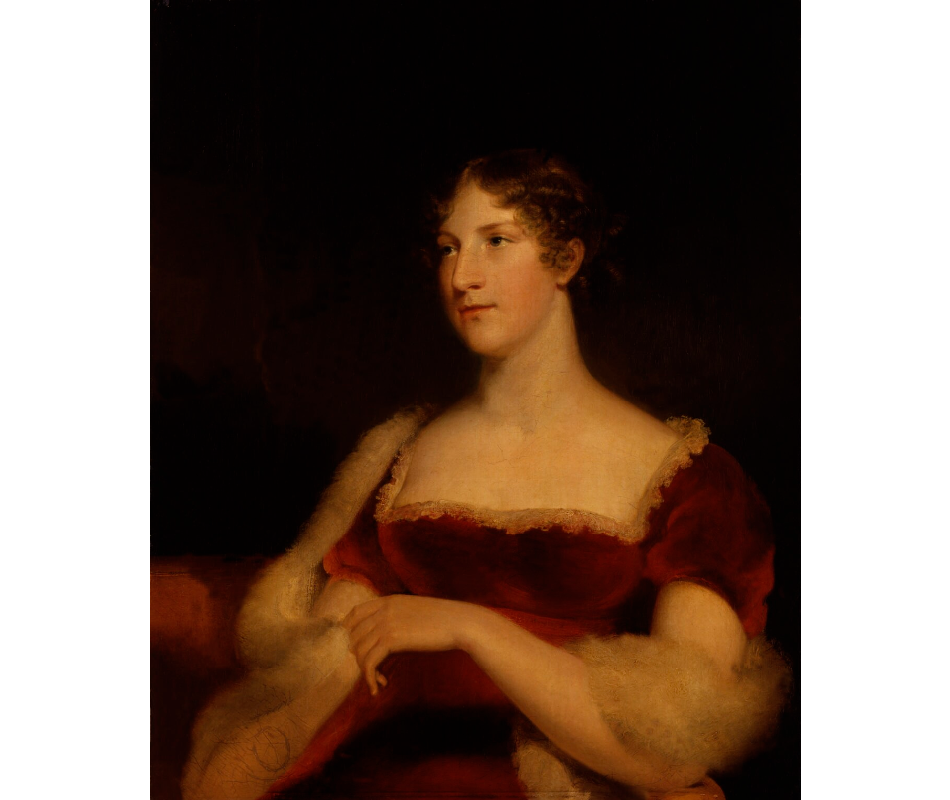Miss O’Neill (eventually Lady Becher) was born in Ireland about the year 1791 and died at Mallow in September 1872. The following interesting details concerning her career are extracted from Sir Bernard Burke’s “Family Romance”
…..Her father, Mr John O’Neill , was at the time of her birth the manager of a strolling company, whose wanderings were pretty extensive, being bounded on the south by the ocean at Kinsale, and on the north by the Giants’ Causeway. Her mother’s maiden name was Featherstone, and to her care the future tragedian was chiefly indebted for her education. She made her first essay as the little Duke of York in Shakespeare’s King Richard the Third, her father playing the part of the crook-backed tyrant. Such was the admiration excited by her talent, that she proved no small pecuniary advantage to her family.
As Miss O’Neill grew, her fame grew with her, and she engaged in what was called the northern circuit, comprising Belfast, Londonderry and Newry. The consequence of her success was an engagement at Dublin. At first Miss O’Neill had some difficulties to contend with, the ground being occupied by established favourites. But she fought her way through all obstacles, till at length she received the offer of a London engagement. Here as before with the Dublin manager, her dramatic family proved something of a stumbling block. The committee of Drury Lane would gladly have engaged Miss O’Neill herself at an enormous salary, but they hesitated in engaging some members of her family to which her affectionate nature made her devotedly attached. John Kemble happened at this time to visit Dublin, and he has left the following record of his opinions in a letter to his brother manager, Mr Harris, of Covent Garden:
“There is a very pretty Irish girl here, with a small touch of the brogue on her tongue; she has much quiet talent and some genius. With a little expense and some trouble we might make her an ‘object’ for John Bull’s admiration in the juvenile tragedy. They call her here – for they are all poets – all Tom Moores here ! – the Dove, in contradistinction to her rival, a Miss Walstein, whom they designate as the Eagle. I recommend the Dove to you as more likely to please John Bull than the Irish Eagle, who, in fact, is merely a Siddons diluted, and would only be tolerated when Siddons is forgotten. I have sounded the fair lady on the subject of a London engagement. She proposes to append a very long family, to which I have given a decided negative. If she accept the offered terms, I shall sign, seal and ship herself and the clan off from Cork direct. She is very pretty, and so, in fact, is her brogue, which, by-the-by, she only uses in conversation. She totally forgets it with Shakespeare and other illustrious companions”.
The young actress accepted John Kemble’s offer at a salary of fifteen, sixteen and seventeen pounds a week. The result fully justified the manager’s judgement. Miss O’Neill’s first appearance before a London audience was on the 6th of October 1812, as Juliet. So highly was she appreciated, that when, upon the fall of the curtain ‘The Merry Wives of Windsor’ was announced for the next evening, the cry was loud and general for the repetition of ‘Romeo & Juliet’.
The career of Miss O’Neill was from this time one of perpetual sunshine and she had left behind her quite as brilliant a memory. She was decidedly one of the greatest actresses and one of the best women (not even excepting Miss Farren) that ever trod the English stage. In characters, such as Juliet, Isabella and Belvidera, where gentleness predominated, Miss O’Neill never had a rival.

Her own fine nature so completely entered into her personification that it is reported that she used to shed real tears while acting, and to feel acutely the wrongs and sorrows of the heroines she represented. This excellent lady, in the midst of her public and social elevation, could hardly be said to have been promoted by marriage when she united on the 18th of December 1819, to a gentleman of high rank and repute – William Wrixon Becher Esquire, M.P. for Mallow. Mr Becher was created a Baronet in 1838, and died in October 1850. His widow survived him just twenty-two years. Their eldest son is the present Sir Henry Wrixon Becher, Bart., of Ballygiblin, County Cork.

